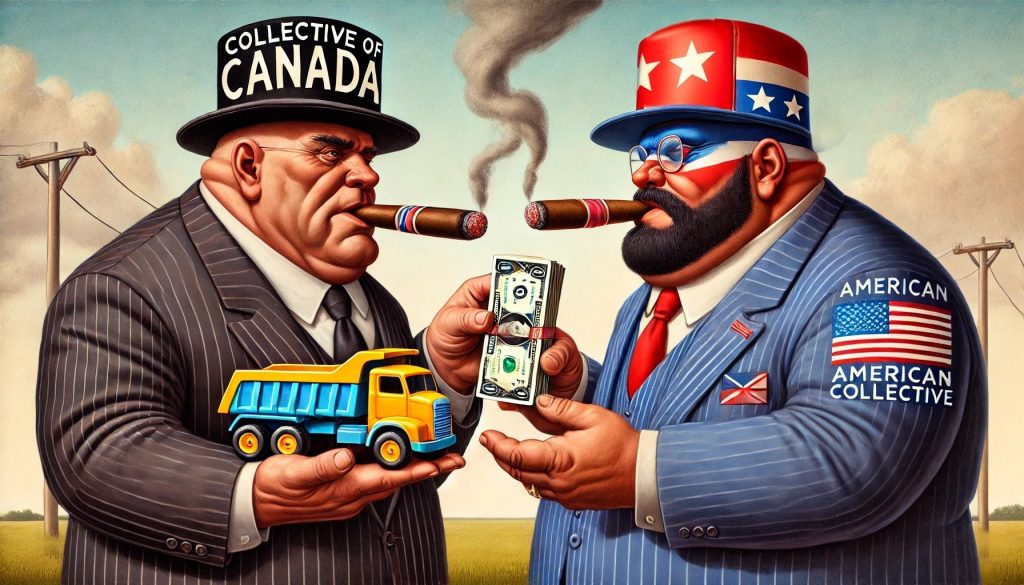There is a fundamental misconception of international trade. Under different disguises and confusions, it is that the collective state trades, instead of individuals and private organizations trading. Recent illustrations are worth reporting.
On his so-called “reciprocal tariffs,” President Trump declared (“Trump’s Next Round of Tariffs—25% on Steel and Aluminum—Won’t Be So Easily Averted,” Wall Street Journal, February 9, 2025):
Very simple, they charge us, we charge them.
Translating the grandiose “we” into actual reality, what he is saying is, “very simple, a foreign state charges tariffs on American exports, the American state taxes the foreign state’s exports to America.” College economics students know that a tariff is a tax charged to importers when a good enters the country and that this tax is generally transferred to domestic consumers by way of an equivalent price increase. So what Trump is really saying is, “very simple, a foreign state charges a tax on its residents, my own state will charge an equivalent tax to our own residents.” Your tribe or collective harms its own, the tribe or collective I run will cause an equivalent harm to its members; it’s that simple.
Not only does elementary economic theory demonstrate this conclusion, but it is continually confirmed by experience to the point where the mere announcement or expectation of domestic tariffs starts pushing up the price of the imported goods and of the substitute domestic goods. In the Wall Street Journal, Greg Ip writes (“Inflation Helped Trump Get Elected. Now It’s His Problem,” February 13, 2025):
This week, [Trump] announced 25% tariffs on all imported steel and aluminum and said reciprocal tariffs on a wider range of products and countries are in the works.
Importers and suppliers are already reacting. Steel companies have already raised prices. Since Trump’s tariff announcement, futures contracts tied to an index of Midwest steel prices have risen about 6%.
Instead of “steel companies have already raised prices,” it would be more exact to say that domestic steel buyers are already bidding up the price of steel in the expectation of tighter quantities in the domestic market.
Another recent case is perhaps even more revealing of the collectivist nature of protectionism. (Let’s not be scared of the word “collectivist.” Communist countries, including the old Soviet Union, claim the collectivist label precisely to emphasize the primacy of collective choices over individual and private choices; but it is still collectivism when the degree or scope of the collective’s supremacy is smaller. It’s a matter of degree.) On February 1, the White House published a fact sheet titled “President Donald J. Trump Imposes Tariffs on Imports from Canada, Mexico, and China,” in which we read:
Access to the American market is a privilege.
What does that mean? The foreign business of an American citizen, or one in which he holds shares, may not export its ware to Americans living in America without the American government’s permission? An American living in America may not, without his government’s permission, import what he wants at terms freely agreed to with a foreign producer or even an American producing abroad? A foreign producer may not offer Americans what they want to buy? In other words, certain trading activities are, for foreigners and Americans, a privilege granted by the collective (or its representative), which may also take a cut (a tariff) on the trade. This is a quite extraordinary and shameless statement.
Trade is exchange. What about the American market for friendship or dating? Is access to this (even virtual) market a privilege for foreigners?
As we can see, the basic error is to conceive international trade as trade conducted by “countries.” The normative dimension of this error is that the liberty to trade should be located not in individuals and their private organizations, but in a collective right controlled by the state. This is not compatible with a free society, which is a society of free individuals.
Visualize two private parties voluntarily and indeed reciprocally trading with each other—say, a poor American in Appalachia and a much poorer worker in Thailand or Vietnam— exchanging American dollars against a textile product through an intermediary such as Walmart. We can say: the man (both men) is liberty! The woman (both women) is liberty! Compare this situation with the power of politicians to decide whether or not, or under which conditions, the exchange will be allowed to proceed. It is not pejoratively but admiratively (we can imagine his mouth open with awe) that Howard Lutnick, now Commerce Secretary, was speaking about Donald Trump (“‘He Is Power’: Billionaires Line Up for Donald Trump’s Inauguration,” Financial Times, January 20, 2025):
“The man is power,” said Lutnick of Trump in a speech on Monday at the Capital One arena, where the president’s supporters gathered to watch him being sworn in. “He is power.”
******************************
